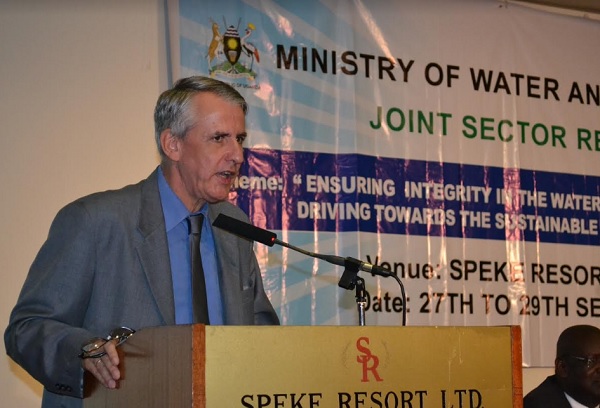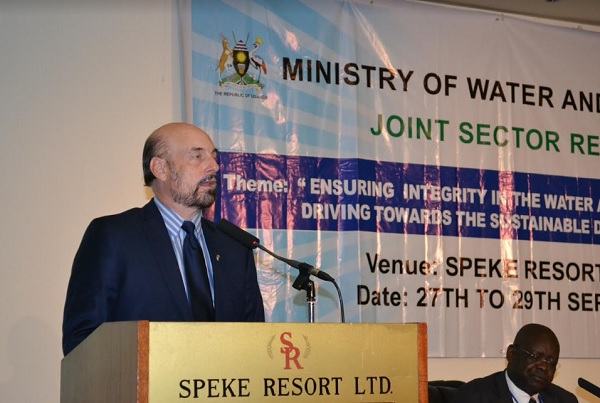
Development partners in the Water and Environment Sector have called upon government and non-government actors to address the challenges of high population growth and effects of climate change in order to improve water and sanitation services, as well as environment and natural resources management.
This was at the closing of the eighth Water and Environment Joint Sector Review on Thursday 29th September at Speke Resort Munyonyo.
The Germany ambassador to Uganda, Dr Peter Blomeyer noted that population growth and rapid urbanization should be the starting point of any water policy. “These are the two challenges that need to be addressed immediately. Today the population of Uganda is 35 million. It is expected to double by 2040 and to rise to 200 million by the end of the century, with most people living in urban centres,” Blomeyer said, appealing to government to make this a key consideration in every intervention.
The Head of Mission United States Agency for International Development (USAID), Mark Meassick also pointed out rapid population growth as one of the numerous issues contributing to the deterioration of the environment and natural resources. “Impacts of a rapidly growing agrarian population, competing land uses, growing illicit wildlife trade, poor institutional coordination, poor governance and weak enforcement systems have all contributed to the decline of forest cover from 24% in 1990 to 11% in 2015,” Meassick said.
The same position was echoed by the Minister of State for Environment, Hon Mary Kitutu, who said that it is important to lower the population growth rate. “Our economy is at 1.7% annual growth rate, yet the population growth is over 3%. We need to lower this. We have started a campaign, and we all need to speak the same language,” Kitutu said.
Earlier at the opening of the three-day joint sector review, the Minister of State for Water, Hon Ronald Kibuule said that he didn’t think that population growth would affect Uganda’s attainment of middle income status by 2020.

The Minster of Water and Environment, Hon Sam Cheptoris disagreed with Kibuule saying, “I don’t usually want to contradict my colleague, but we must discourage high population growth. We must understand that the government of Uganda is serious about reducing high population growth. It is a serious problem that we must deal with.”
The joint sector review is an annual forum where all actors in the water and environment sector convene to discuss progress and set new targets for the forthcoming year.
The 2015/16 review was dominated by discussions around environmental degradation and climate change, the effects of which are already affecting water, sanitation and hygiene service delivery. Actors emphasized that water and environment were central to the attainment of the middle income status by 2020, as well as other targets set in the second National Development Plan (NDPII) and the Sustainable Development Goals (SDGs).
There were repeated calls for the better management of wetlands and natural forest cover, of which the rate of destruction far outstrips the level of restoration and replanting.
Actors also called for better sector governance, characterized by transparency and accountability. They also called for a reduction in inequality in service provision; increase in compliance to laws pertaining to environment and natural resources; involvement of communities in environment management projects; investment in research and better coordination among the key ministries concerned with water and environment including Ministry of Agriculture, Ministry of Local Government, Ministry of Health and Ministry of Education.
“Let us stop talking and start acting. Less workshops and more action,” Minister Kitutu said as she called upon all participants to work together with the government to improve the water and environment sector.
 The Independent Uganda: You get the Truth we Pay the Price
The Independent Uganda: You get the Truth we Pay the Price



